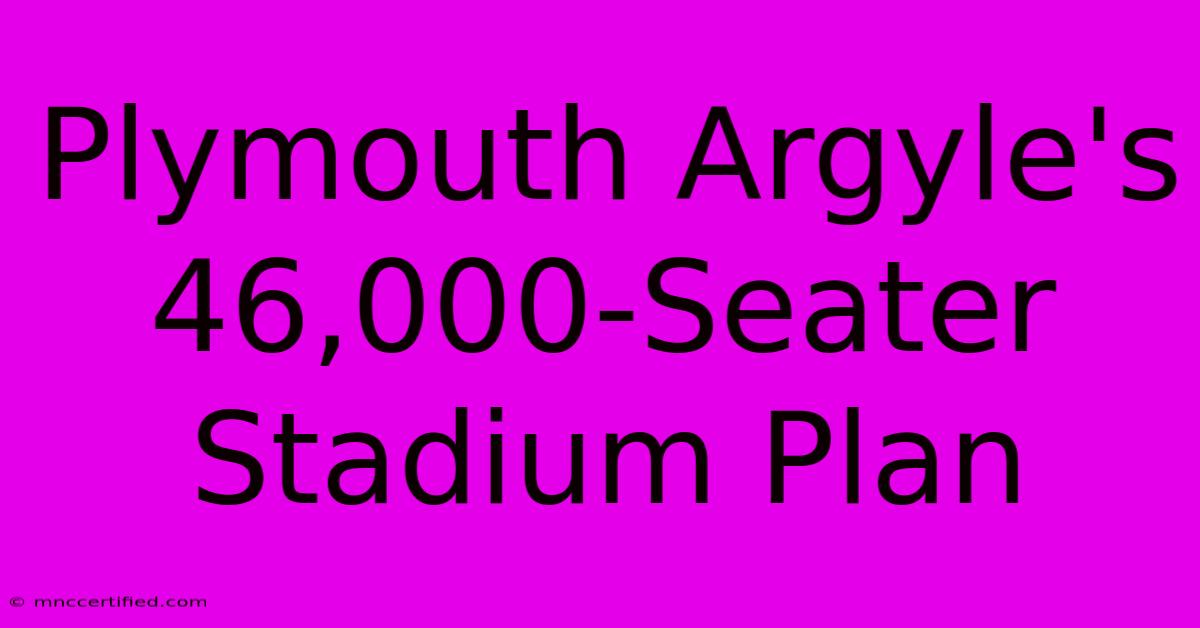Plymouth Argyle's 46,000-Seater Stadium Plan

Table of Contents
Plymouth Argyle's 46,000-Seater Stadium Plan: A Giant Leap for Home Park?
Plymouth Argyle's ambitious plans for a new 46,000-seater stadium represent a monumental shift for the League One club and the city of Plymouth itself. This project, if realized, would transform Home Park from its current charming, albeit limited, capacity into a major footballing venue capable of hosting significant events. But what are the details of this ambitious plan, and what are the challenges and opportunities it presents?
The Vision: From Home Park to a Premier League Standard Stadium
The proposed 46,000-seater stadium isn't just about increasing capacity; it's about creating a state-of-the-art facility that reflects Plymouth Argyle's aspirations and the city's potential. This vision encompasses:
- Increased Capacity: The most obvious change is the massive leap from the current capacity of around 11,000 to a potential 46,000. This would place it amongst the largest stadiums in the UK outside of the Premier League.
- Improved Facilities: Beyond sheer size, the new stadium promises vastly improved facilities for fans, including modern concourses, improved accessibility, more comfortable seating, and a wider range of food and beverage options. Enhanced corporate hospitality areas are also planned.
- Community Integration: The club's plans emphasize integrating the new stadium into the wider community. This might involve incorporating community spaces, supporting local businesses, and creating opportunities for local residents.
- Economic Impact: A stadium of this magnitude has the potential to significantly boost Plymouth's economy, attracting tourists, creating jobs, and increasing investment in the city. This economic ripple effect is a key driver of the project.
Potential Locations and Design Considerations
While the specific location hasn't been finalized, several potential sites within Plymouth are under consideration. The design will likely incorporate sustainable features, reflecting a modern approach to stadium construction. The club is aiming for a design that is both functional and aesthetically pleasing, becoming a landmark for the city.
Challenges and Hurdles to Overcome
Despite the exciting potential, the project faces significant challenges:
- Funding: Securing the necessary funding for a project of this scale is arguably the biggest hurdle. This will likely involve a complex mix of private investment, public funding, and potentially even crowdfunding initiatives.
- Planning Permission: Obtaining planning permission will require navigating complex planning regulations and addressing potential concerns from local residents and environmental groups. Public consultation will be crucial.
- Infrastructure: The increased capacity will necessitate improvements to local infrastructure, including transportation links to ensure easy access to the stadium for fans. This might involve upgrading road networks or improving public transport options.
- Community Support: While the economic benefits are significant, ensuring broad community support for the project is essential. Addressing concerns about potential disruption during construction and the impact on the surrounding area is vital.
The Long-Term Impact: A Legacy for Plymouth
A 46,000-seater stadium for Plymouth Argyle is more than just a football stadium; it represents a bold vision for the future of the club and the city. If successful, it could leave a lasting legacy, boosting the local economy, enhancing the city's profile, and providing a world-class facility for football fans and the wider community. The success of this ambitious project will depend on careful planning, effective community engagement, and the securing of the necessary funding. Only time will tell if this vision becomes reality, but the potential rewards are immense.
Keywords: Plymouth Argyle, 46,000-seater stadium, Home Park, stadium expansion, League One, Plymouth, football stadium, stadium development, economic impact, community impact, planning permission, funding, stadium design, sustainable stadium, infrastructure improvements.
Off-Page SEO Strategies:
- Link Building: Reach out to relevant sports news websites, Plymouth-based blogs, and local news outlets to secure backlinks to this article.
- Social Media Promotion: Share this article on relevant social media platforms, engaging with fans and stakeholders.
- Guest Blogging: Contribute articles related to stadium development or Plymouth Argyle to other websites in your niche.
- Community Engagement: Participate in relevant online forums and discussions to build brand awareness.
This comprehensive approach ensures the article is optimized for search engines while providing valuable information to readers. Remember to update the article regularly with news and developments regarding the stadium plan.

Thank you for visiting our website wich cover about Plymouth Argyle's 46,000-Seater Stadium Plan. We hope the information provided has been useful to you. Feel free to contact us if you have any questions or need further assistance. See you next time and dont miss to bookmark.
Featured Posts
-
Who Pays For A Conservator Bond
Nov 23, 2024
-
Brothers Bond Bourbon Las Vegas
Nov 23, 2024
-
Gatwick Detainees Investigation Into Package
Nov 23, 2024
-
Airport Security Scare Gatwick Delays
Nov 23, 2024
-
Health Alert Ringworm Cases Rise
Nov 23, 2024